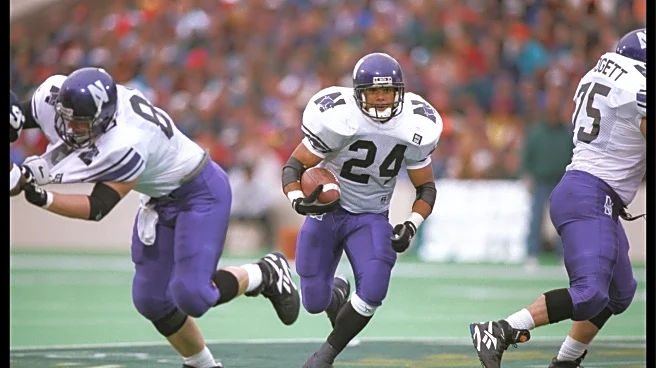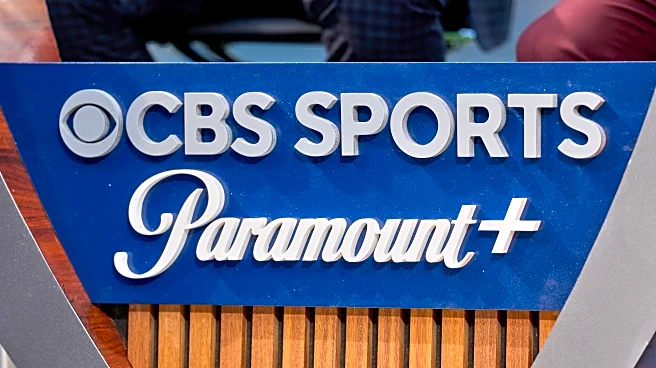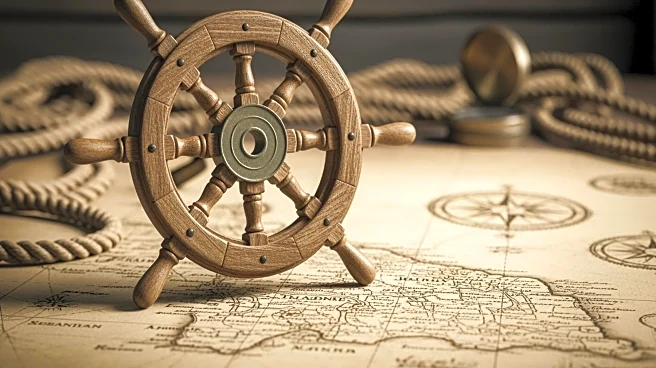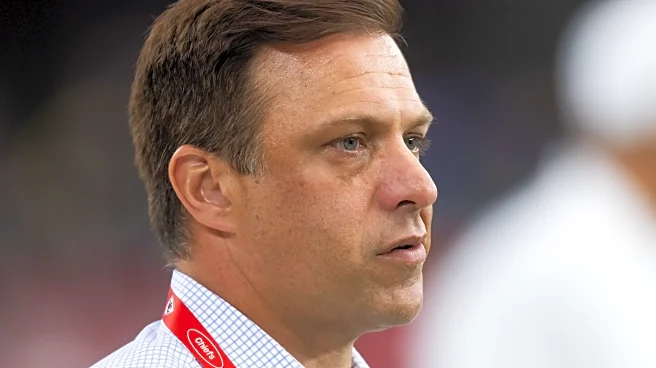On Sept. 13, ahead of Northwestern football’s home contest against No. 4 Oregon, Inside NU caught up with former Wildcat running back Darnell Autry. Autry was at the FOX Big Noon Kickoff pregame show,
where he partnered with Discover Field Access to do a meet and greet. A Heisman Trophy finalist and one of the stars on Northwestern’s 1995 and 1996 squads that made the Rose Bowl, Autry is widely regarded as amongst the best to don purple and white.
A former theater major at Northwestern, Autry is in the process of launching Team Autry, a TV/film production company specializing in sports content. But he’s still following his alma mater’s program, speaking to the current team on the day before it faced the Ducks.
Autry spoke to Inside NU about the current state of Northwestern football, as well as some of the events surrounding the program and college sports as a whole. Although Northwestern lost 34-14 to Oregon and didn’t pull off an upset like he hoped, he is still optimistic about the future of the program.
This transcript has been edited for clarity and length.
Inside NU: What brings you back to Evanston?
Darnell Autry: I’m here today partnering with Discover Card for Discover Field Access. Just an opportunity to connect back with the Northwestern family and friends and get a big win today.
INU: Big Noon Kickoff is here for the first time in school history. What do you think that means to the Northwestern program?
DA: I think it means that we’re stepping in the right direction. We’re doing the right things with a big opportunity. We’re big underdogs against the number four team in the country. It feels very, very familiar to my past experience. So it’s a good opportunity for the guys to get a big win, and hopefully we make it happen.
INU: How do you feel about the Northwestern season and the way it’s going right now?
DA: Every year you start optimistic, right? Every year you feel really good about your opportunities. But I think this year is different, because I was talking to the coaches earlier today and they were saying that the leadership and the accountability are much, much better on this team. So I have huge expectations for them this year. I really think if they come out and play very well today, hopefully they get a win. This can really set up their whole season.
INU: Amidst that season, there was the recent news that Cam Porter is out for all of 2025, potentially ending his college career. As a fellow running back, how can you speak to his legacy and the impact he’s had on this team?
DA: It’s absolutely heartbreaking to see that happen to him. I know he’s hurting, but bigger things are coming for him. As with the team, it’s about] the next guy up. Unfortunately, that’s the way sports work. If one of your leadership goes down, somebody else has to step up. After being with those guys yesterday, I think some of those young guys should be able to step up.
INU: What did you pick up on when you talked to the younger guys in the running back room, especially Joe Himon II and Caleb Komolafe? What have you seen from them?
DA: These young guys are hungry. They seem very hungry to me. They feel like they’re ready to make an impact on this team. And I think that’s what you need. That’s across the board, same with the offensive line, same with the running backs. Sometimes people have to step up to become leaders.
INU: And speaking of leaders, head coach David Braun is in his third year under the helm. What kind of job do you think he’s done, and how well do you think he’s been as the leader of Northwestern’s team?
DA: I think he started out pretty well. Obviously, last year was a rougher season for him, but I think this year, you get opportunities to get great wins. You get opportunities to lead your team into an uphill battle, and if you could succeed in those, I think you get an opportunity to extend your career. And I think these are set up for him right now. I like the kinds of things that he’s saying to the guys. I like how he’s supporting them. I like how he sees the season and how he wants to accomplish big things. So I feel like they’re in really good hands.
INU: The program has obviously been through a lot of changes in recent years. How do you feel Northwestern, as a program and school, has been handling everything?
DA: It’s a lot to navigate, and it’s a lot to work through. I think we’re doing a fairly good job of navigating it. We turned the right corner by adding Braun into the situation. [Pat Fitzgerald’s] situation got settled, which was great for everybody. [Henry S.] Bienen’s back at Northwestern which is also good for me, in terms of how the Preisdent that came back was originally our president. But it’s a lot to go through. I think they’re doing the right things and turning the corners. We’ll see.
INU: Have you spoken to Fitzgerald at all recently, as his former Northwestern teammate?
DA: No, I have not had a chance in a while. I know he’s going through a lot. I know he and his family are working through some things. I just wanted to give him some space. I think that everything works out for a reason, and I really hope that from this point on, he gets another opportunity to coach somewhere else and that we can move on at Northwestern and get back to the program that we know how to be.
INU: And what do you think Northwestern has to do to get back to the Rose Bowl days?
DA: You’ve got to win big games like this. It’s not enough to be competitive. It’s not enough to be like, ‘Oh, we were close.’ If you win big games like this, then it builds your confidence, so that the next big game, you win that game. And then it just becomes contagious. But how you start to win big games is that you have one guy that makes a play, then that guy influences another guy to make a play, and then that guy feeds another guy on offense, and then before you know it, you’ve got half the team all starving to try to make big plays. When you’re down by seven or up by seven, someone has to make you play. There’s no doubt that’ll happen. And then you win, and then that builds the next. It starts first by playing the game, and then it goes moment to moment. And before you look up, you’re in the Big Ten championship.
INU: A big part of starting plays is Preston Stone, who has been one of the biggest storylines of the season. He’s had an up-and-down start — what have you seen from him and how do you feel like he can progress throughout the year?
DA: There’s a lot of pressure. I mean, you’re joining a team, you’re not sure what to expect. I like the fact that it is up-and-down, or the fact that you show me something — that you can win a game, and show me being consistent. Settle everybody down and you make a play, and then you let your running backs make a play and then your offensive line makes a play. Just stay consistent and manage the game.
INU: Coach Braun always says that he doesn’t want Stone to feel like he’s doing everything by himself.
DA: And fortunately, football’s not like that anyway. You may have a couple of stars on your team, but they can’t do it all. Everybody has to contribute.
INU: Shifting gears — speaking of recent changes to the program, there’s the temporary stadium by Lake Michigan and then the new Ryan Field project. What are your thoughts on the Northwestern stadium situation, both in terms of the temporary one and the new one being built?
DA: I think it’s really exciting. This is a great environment, and it’s only going to get better when the big stadium opens up. I look forward to seeing what it looks like next year.
INU: The new Ryan Field is about to be the most expensive stadium in college football, with a budget of $862 million. Do you ultimately think that investment is worth it?
DA: Absolutely. Any time you can invest in good-quality facilities, it’s always going to be worth it. I mean, the guys will look around and say, ‘Listen, this is how much this program cares about recruiting. This is how much this program cares about you. Current guys that are here, this is how much this program cares about you by the amount of money being invested.’ I think it’s great, and I do think it’ll pay off for sure.
INU: What are you currently doing with your career?
DA: I just started a TV/film production company focused on scripted and unscripted sports content. I know so many great stories. I’ve had a lot of ups and downs in my life in terms of sports. I want to tell those stories. I run into a lot of guys with great stories and no one’s ever told them.
Not everyone is a star. I’m an example — in the NFL, I wasn’t a star. But I have a story, right? We’re going to focus on telling stories about athletes you’ve never heard of. We’re gonna dig a little deeper into telling stories about cautionary tales, because there are a lot of cautionary tales.
INU: What’s the company called?
DA: It’s gonna be Team Autry Productions based out of Tempe, Arizona. We’re working on a variety of things currently. Hopefully, in the next couple of weeks, we should be able to make some announcements on some things that we partnered with.
INU: You sued the NCAA back in your college career, so they could let you act in a movie without losing eligibility. Right now, with the NIL era, that isn’t much of an issue anymore. How do you feel college sports, and specifically NIL, have progressed nowadays, and do you think you would have been more involved in film as a college athlete now?
DA: I’ve gotta be honest, as an old guy, I’m just jealous. But I’m glad that right now they have the opportunity to earn money, to get exposure. This experience in college is once-in-a-lifetime, and it’s great that they can be paid for that experience. Maybe they might, maybe they won’t, but either way, I’ll always support the players making that money. But what I did was make sure that [athletes] have an opportunity. When I sued the NCAA, it wasn’t about the money. It was about the opportunity to be in the movie.
INU: And with all these changes in college sports, is it as easy right now to have that national success as an underdog team in college football, the way it was for you guys back then?
DA: It’s a little different because there’s a lot more exposure, a lot more media. These guys aren’t going to “sneak up” on anybody. Everybody plays everybody, everybody has more information about the players that you do and don’t have on your team. I don’t think you can sneak up on anybody, but can you play better? Can you make plays unexpectedly? Can you win that game that maybe everyone thought you weren’t?
You watch games at halftime and you’re like, ‘Oh, this is closer than I thought.’ Third quarter, ‘wait, they’re only down by one.’ Fourth quarter, now everybody’s panicking because this game should be a blowout, and why is this not happening? All of a sudden, there’s a turnover and now, we’ve got the ball at the 30, going in to win the game.










